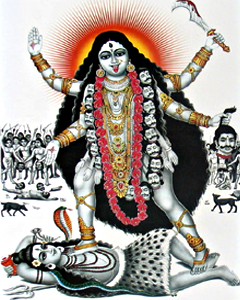 Vidyasundar was a story that created a craze when it was written. This was written under the patronage of Maharaja Krishnachandra of Nadiya. Its origin lies in Sanskrit. The story is that of a love-intrigue between a princess named Vidya and a foreign prince named Sundar. The lovers employ, as a go-between, a woman who supplies flowers to the royal household. They meet secretly in Vidya`s chamber until she being with child is discovered. Sundar is destined to die. However he is saved by the goddess Kali whose disciple he is. In the end his identity is revealed and Vidya`s father happily accepts him as his son-in-law.
Vidyasundar was a story that created a craze when it was written. This was written under the patronage of Maharaja Krishnachandra of Nadiya. Its origin lies in Sanskrit. The story is that of a love-intrigue between a princess named Vidya and a foreign prince named Sundar. The lovers employ, as a go-between, a woman who supplies flowers to the royal household. They meet secretly in Vidya`s chamber until she being with child is discovered. Sundar is destined to die. However he is saved by the goddess Kali whose disciple he is. In the end his identity is revealed and Vidya`s father happily accepts him as his son-in-law.
The original Sanskrit story was entirely secular and there was no role of Goddess Kali or any other deity as an agent. The introduction of Kali element has made it a good plot. This story owes its immortality to Bharat Chandra Ray. His great work the Kalika-mangal is a loosely strung collection of three long and separate poems: Annadd-mangal, the Vidya-Sundar and the Mansimha. It was completed in 1752 and Vidya-Sundar is the best piece in it.
Vidya-Sundar is a love-poem. It is irresponsible, artificial, witty and elegant. The author laughs at high society but does not inculcate morals. The whole objective is to amuse and entertain.
This article is a stub. You can enrich by adding more information to it. Send your Write Up to content@indianetzone.com



















